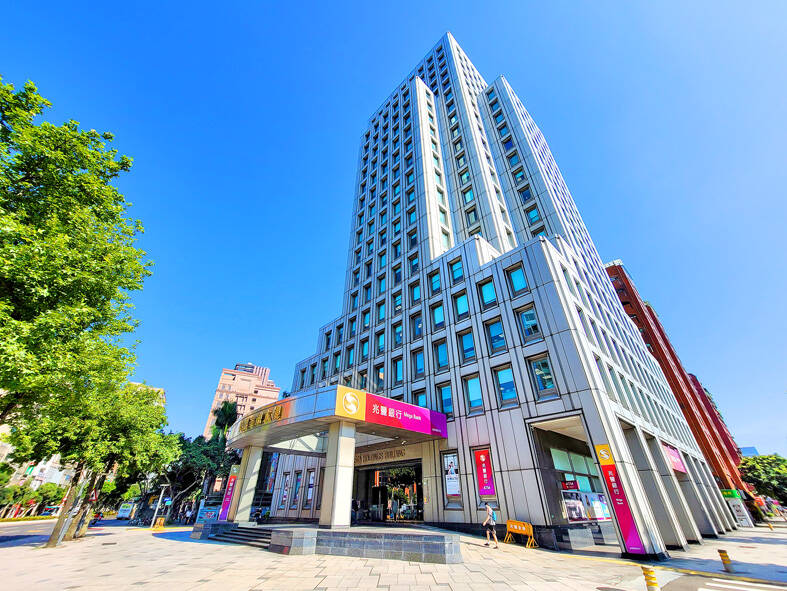State-run Mega Financial Holding Co (兆豐金控) yesterday said that it expects loan growth this year, helped by an export-driven economic recovery, and is eyeing solid gains in wealth management amid a pickup in investment sentiment
“We would seek to remain the best performer in terms of earnings ability this year among state-run peers,” Mega Financial chairman Lei Chung-dar (雷仲達) told an online investors’ conference.
The group would consolidate its leadership position in syndicated loans, corporate banking and foreign currency operations, Lei said.

Photo courtesy of Mega Financial Holding Co
Net income last year surged 81 percent to NT$33.25 billion (US$1.05 billion), or earnings per share of NT$2.37, outperforming other state-run financial institutions, he said.
That is because interest rate hikes at home and abroad shored up interest incomes, while restrictive monetary policies increased funding costs and inhibited loan demand, Mega Financial said.
Hopefully, the situation would ease in the second half of this year after the US Federal Reserve starts to cut interest rates, making corporations more willing to take out loans, it added.
However, the interest rate gap between Taiwan and the US would mitigate, becoming less favorable for foreign exchange swap operations, which generated more than NT$10 billion in trading gains last year, it said.
The company’s banking arm, Mega International Commercial Bank (兆豐銀行), expects local tech firms to display more borrowing interest this year on the back of a positive technology product cycle and a recent artificial intelligence frenzy, Mega International Commercial Bank president David Hu (胡光華) said.
At the same time, Mega Financial is seeking to increase sales of mutual funds and insurance policies by 30 percent this year, as Taiwanese demonstrate better risk appetite, Mega Financial said, citing avid interest among retail investors for exchange-traded funds.
Mega Bank is collaborating with department stores, airlines, travel agencies and online hotel booking operators to win customers and boost credit card spending, it said.
However, the group’s non-life insurance wing, Chung Kuo Insurance Co (兆豐產險), remained a profit drag due to lingering COVID-19 insurance claims, it said.
Chung Kuo Insurance is contemplating capital increase plans to improve its financial health after setting aside NT$2.8 billion last year, it added.
Mega Financial declined to comment on its dividend policy except that the board of directors will discuss the matter next month.

SEMICONDUCTORS: The German laser and plasma generator company will expand its local services as its specialized offerings support Taiwan’s semiconductor industries Trumpf SE + Co KG, a global leader in supplying laser technology and plasma generators used in chip production, is expanding its investments in Taiwan in an effort to deeply integrate into the global semiconductor supply chain in the pursuit of growth. The company, headquartered in Ditzingen, Germany, has invested significantly in a newly inaugurated regional technical center for plasma generators in Taoyuan, its latest expansion in Taiwan after being engaged in various industries for more than 25 years. The center, the first of its kind Trumpf built outside Germany, aims to serve customers from Taiwan, Japan, Southeast Asia and South Korea,

Gasoline and diesel prices at domestic fuel stations are to fall NT$0.2 per liter this week, down for a second consecutive week, CPC Corp, Taiwan (台灣中油) and Formosa Petrochemical Corp (台塑石化) announced yesterday. Effective today, gasoline prices at CPC and Formosa stations are to drop to NT$26.4, NT$27.9 and NT$29.9 per liter for 92, 95 and 98-octane unleaded gasoline respectively, the companies said in separate statements. The price of premium diesel is to fall to NT$24.8 per liter at CPC stations and NT$24.6 at Formosa pumps, they said. The price adjustments came even as international crude oil prices rose last week, as traders

SIZE MATTERS: TSMC started phasing out 8-inch wafer production last year, while Samsung is more aggressively retiring 8-inch capacity, TrendForce said Chipmakers are expected to raise prices of 8-inch wafers by up to 20 percent this year on concern over supply constraints as major contract chipmakers Taiwan Semiconductor Manufacturing Co (TSMC, 台積電) and Samsung Electronics Co gradually retire less advanced wafer capacity, TrendForce Corp (集邦科技) said yesterday. It is the first significant across-the-board price hike since a global semiconductor correction in 2023, the Taipei-based market researcher said in a report. Global 8-inch wafer capacity slid 0.3 percent year-on-year last year, although 8-inch wafer prices still hovered at relatively stable levels throughout the year, TrendForce said. The downward trend is expected to continue this year,

Taiwan Semiconductor Manufacturing Co (TSMC, 台積電), which supplies advanced chips to Nvidia Corp and Apple Inc, yesterday reported NT$1.046 trillion (US$33.1 billion) in revenue for last quarter, driven by constantly strong demand for artificial intelligence (AI) chips, falling in the upper end of its forecast. Based on TSMC’s financial guidance, revenue would expand about 22 percent sequentially to the range from US$32.2 billion to US$33.4 billion during the final quarter of 2024, it told investors in October last year. Last year in total, revenue jumped 31.61 percent to NT$3.81 trillion, compared with NT$2.89 trillion generated in the year before, according to